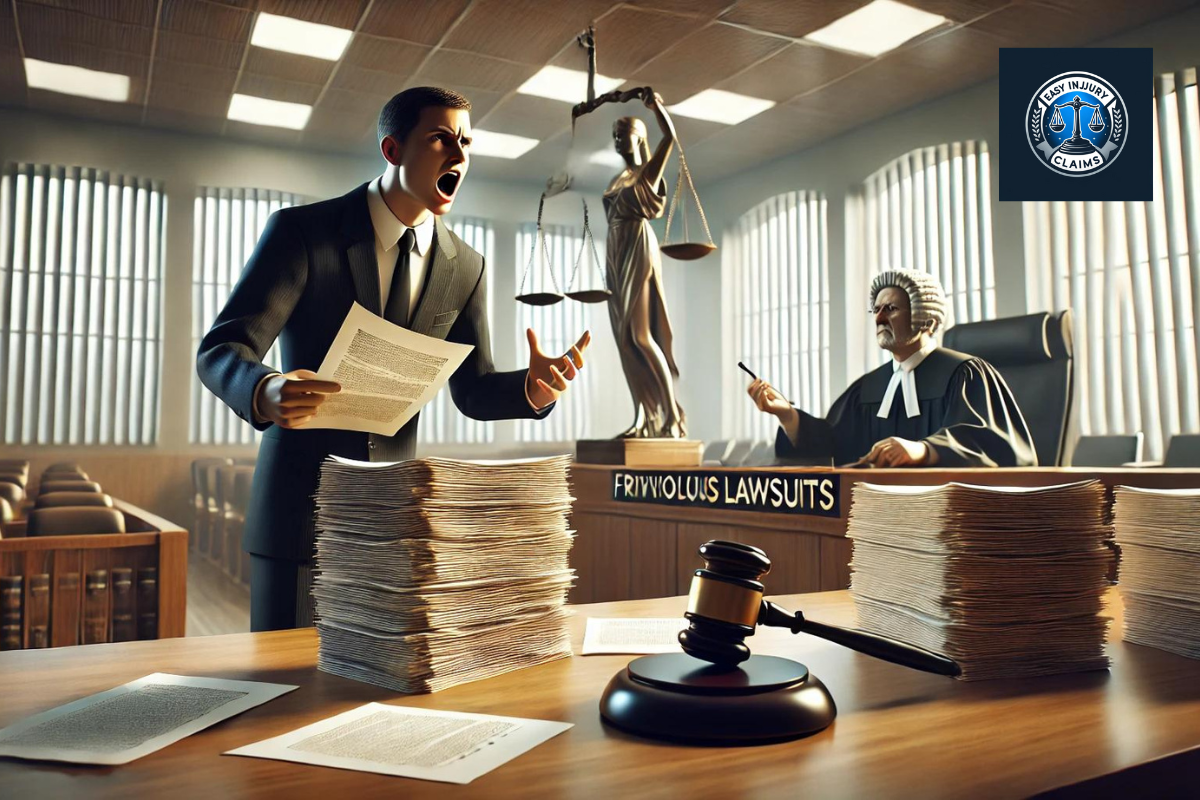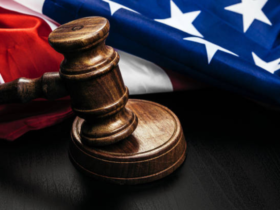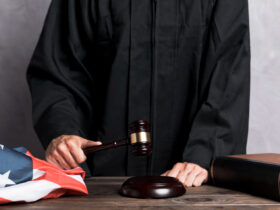Introduction to Frivolous Lawsuits
What is a frivolous lawsuit?
A frivolous lawsuit is a legal case filed without any real merit or valid reason. The person filing the lawsuit does not have enough facts or evidence to support their claim. The goal is often to cause trouble for someone, get money, or make a point rather than win based on strong legal arguments. Courts usually dismiss these frivolous lawsuits because they are seen as wasting time and resources.
Brief history and origins of the term
The term frivolous lawsuit comes from the legal system. It has been used for many years to describe cases that lack serious legal backing. Early legal systems developed rules to stop people from abusing the court with weak or fake claims. The term became popular in modern law as more people started using the courts to file frivolous lawsuits for personal gain, revenge, or publicity. Courts created penalties to prevent these types of cases from continuing.
Common Examples of Frivolous Lawsuits
High-profile frivolous lawsuit cases
There have been many high-profile frivolous lawsuit cases that gained attention due to their unusual or baseless nature. One famous example is the case where a man sued a fast-food chain for making him overweight. Another is the case where a woman sued a coffee shop because she spilled hot coffee on herself and claimed it caused burns. These frivolous lawsuits are often dismissed by courts, but they still make headlines and bring attention to the issue of frivolous lawsuits in the legal system.
Examples from various industries
Frivolous lawsuits happen in many industries. In business, companies sometimes face frivolous lawsuits from competitors or disgruntled customers. For example, a business might be sued for false reasons, like claiming their product caused harm without evidence. In the personal injury sector, frivolous lawsuits are common when people try to sue for accidents or injuries that are either fake or exaggerated. Other industries, such as healthcare and entertainment, also see frivolous lawsuits filed to pressure businesses into settling, even when the claims are not real.
Legal Definition and Criteria for a Frivolous Lawsuit
What makes a lawsuit frivolous in legal terms?
A frivolous lawsuit is defined as a case that lacks any legal basis or serious argument. It is filed with no real evidence or valid claim. The lawsuit is often intended to harass, delay, or force a settlement, rather than to resolve a genuine legal dispute. Courts see these frivolous lawsuits as a misuse of the legal process because they do not present valid facts or arguments.
How courts determine frivolousness
Courts look at whether a lawsuit has any merit when deciding if it is frivolous. If the case is clearly weak, with no strong evidence or legal foundation, the court may rule it as a frivolous lawsuit. Judges check if the claims made in the lawsuit have any chance of success under the law. If the claims are unreasonable or meant to waste time, the court will often dismiss the lawsuit as frivolous.
Differences between frivolous lawsuits and legitimate legal claims
The main difference between frivolous lawsuits and legitimate claims is that real claims are backed by evidence, facts, and legal reasoning. A legitimate claim seeks to solve a real problem or injury with proof. In contrast, a frivolous lawsuit has no real purpose or valid argument. Legitimate lawsuits are filed in good faith, while frivolous lawsuits are often filed to abuse the legal system or pressure someone for personal gain.
Motives Behind Filing Frivolous Lawsuits
Financial gain
One common motive for filing a frivolous lawsuit is the hope of getting financial gain. The person filing may expect the other party to settle the case to avoid expensive legal fees or negative publicity. Even without a strong case, some people use frivolous lawsuits to pressure companies or individuals into paying money.
Intimidation or harassment
Another reason people file frivolous lawsuits is to intimidate or harass someone. The lawsuit might be used as a tool to cause stress, waste time, or force the other party to spend money defending themselves. These frivolous lawsuits are often aimed at punishing someone or creating difficulties for them without any legal merit.
Seeking publicity or personal vendetta
Some frivolous lawsuits are filed to get attention or as part of a personal vendetta. The person may want media coverage, fame, or to damage someone’s reputation. In these cases, the frivolous lawsuit is less about winning and more about using the legal system to get revenge or to draw public attention to a personal issue.
Consequences of Filing a Frivolous Lawsuit
Legal penalties for filing frivolous lawsuits
Filing a frivolous lawsuit can lead to serious legal penalties. Courts may dismiss the case and rule that the lawsuit was without merit. In many cases, the person who filed the frivolous lawsuit can face punishment for wasting the court’s time and resources. These penalties are meant to discourage people from abusing the legal system.
Fines, sanctions, and attorney fees
When a court determines that a lawsuit is frivolous, the filer may be ordered to pay fines or sanctions. These fines can be costly and are designed to cover the expenses caused by the frivolous lawsuit. The filer may also have to pay the attorney fees of the other party, which can add to the financial burden. This helps prevent people from filing frivolous lawsuits just to force a settlement.
Impact on the filer’s reputation and future legal actions
Filing a frivolous lawsuit can damage the filer’s reputation. Courts and future legal opponents may view the person as someone who abuses the legal system. This can make it harder for the person to file legitimate claims in the future, as judges may be less likely to take their cases seriously. The damage to their credibility can have lasting effects on their personal and professional life.
Impact of Frivolous Lawsuits on the Legal System
How they burden the courts
Frivolous lawsuits place a heavy burden on the court system. These cases take up valuable time and resources that could be spent on legitimate legal matters. Judges, court staff, and legal professionals must deal with these baseless claims, which slows down the judicial process. This waste of time caused by frivolous lawsuits affects the efficiency of the courts.
Costs to taxpayers and businesses
The financial impact of frivolous lawsuits extends to both taxpayers and businesses. Taxpayers bear the cost of maintaining the court system, and when frivolous lawsuits take up time, these costs increase. Businesses also suffer financially from having to defend against frivolous lawsuits, often having to pay legal fees and settlements, even when the claims lack merit.
Delays for legitimate cases
One of the most serious effects of frivolous lawsuits is the delay they cause for legitimate cases. With the courts bogged down by frivolous lawsuits, people with real legal issues may have to wait longer for their cases to be heard. This can lead to frustration for those seeking justice, as their cases are delayed due to unnecessary legal claims.
How to Defend Against a Frivolous Lawsuit
Steps for individuals and businesses to protect themselves
To defend against a frivolous lawsuit, individuals and businesses should act quickly and stay calm. The first step is to gather all necessary documents, records, and evidence to prove that the claim is without merit. Keeping good records is important for protecting yourself. Communicating with your attorney early and being proactive can help prevent the frivolous lawsuit from escalating.
Legal strategies and responses
One common legal strategy to deal with a frivolous lawsuit is filing a motion to dismiss the case. This motion asks the court to throw out the lawsuit because it lacks any legal basis. Another option is to request sanctions or fines against the person filing the frivolous lawsuit for wasting the court’s time. You can also seek to recover legal fees if the court rules in your favor, further discouraging frivolous lawsuits.
Role of an attorney in defending frivolous claims
An experienced attorney plays a key role in defending against frivolous claims. The attorney will guide you through the legal process, help prepare your defense, and handle court filings. They can assess the strength of the frivolous lawsuit and develop strategies to get it dismissed. Attorneys are skilled at protecting their clients from unnecessary legal battles and ensuring that frivolous lawsuits are dealt with efficiently.
Laws and Sanctions Against Frivolous Lawsuits
Overview of U.S. laws (Federal Rule 11, Anti-SLAPP statutes, etc.)
In the U.S., several laws exist to prevent frivolous lawsuits. One of the most important is Federal Rule 11, which requires that attorneys and plaintiffs ensure their claims are legitimate before filing a lawsuit. If a lawsuit is found to be frivolous, the court can impose penalties, including fines and legal fees.
Anti-SLAPP statutes (Strategic Lawsuits Against Public Participation) are another legal tool used to stop frivolous lawsuits. These laws protect individuals and organizations from being sued simply for exercising their right to free speech, such as criticizing businesses or public figures. Anti-SLAPP laws allow defendants to quickly dismiss frivolous lawsuits and recover legal costs.
International perspectives: How other countries handle frivolous lawsuits
Many countries outside the U.S. also have measures to prevent frivolous lawsuits. In the U.K., the legal system requires the losing party in a lawsuit to pay the winning party’s legal fees. This discourages people from filing weak or frivolous lawsuits.
In Canada, courts have the power to impose fines or dismiss cases that are clearly frivolous. Other countries, like Australia, have introduced similar laws that allow courts to punish those who file frivolous lawsuits and waste legal resources.
Key legal precedents and rulings
Several key legal precedents have shaped how courts handle frivolous lawsuits. In Chambers v. NASCO, the U.S. Supreme Court ruled that courts have the power to sanction those who abuse the legal system by filing frivolous lawsuits. Another important case, Business Guides, Inc. v. Chromatic Communications Enterprises, Inc., reinforced the use of Federal Rule 11 to punish those who file lawsuits without proper legal backing.
Frivolous Lawsuits in Different Sectors
Business and corporate world
In the business sector, frivolous lawsuits are often filed by competitors or disgruntled customers. Companies may face legal claims that lack evidence or merit, with the filer seeking to harm the business’s reputation or force a quick settlement. These frivolous lawsuits can be costly for businesses, as they may lead to legal fees, wasted time, and potential damage to their brand image. Some cases involve disputes over contracts, false accusations of wrongdoing, or unfounded claims of fraud.
Medical malpractice lawsuits
Frivolous lawsuits are also common in the medical field. Some patients file frivolous lawsuits against doctors and healthcare providers for medical malpractice, even when there is no clear evidence of negligence. These lawsuits can hurt medical professionals by raising insurance premiums and leading to unnecessary legal battles. Defending against frivolous lawsuits in healthcare takes time and resources away from patient care, adding pressure on doctors and hospitals.
Personal injury claims
In the realm of personal injury, frivolous lawsuits occur when someone exaggerates or fakes injuries in an attempt to win compensation. These claims often target businesses or individuals, accusing them of causing harm through accidents or negligence. Personal injury frivolous lawsuits may arise from minor incidents or fabricated accidents, with the goal of securing a settlement or payout. Such cases can overload courts and cause delays for legitimate injury claims.
Intellectual property disputes
The intellectual property (IP) sector is not immune to frivolous lawsuits. Companies or individuals sometimes file baseless lawsuits claiming that someone else has infringed on their trademark, copyright, or patent, even when there is no valid legal basis. These frivolous lawsuits are often filed to stifle competition or force settlements from smaller businesses. Defending against frivolous lawsuits in IP disputes can be expensive and time-consuming, as these cases usually involve complex legal arguments.
The Role of Insurance in Frivolous Lawsuits
How insurance companies handle frivolous claims
Insurance companies play a key role in managing the financial impact of frivolous lawsuits. When a frivolous claim is filed, insurance companies assess whether the claim is valid and if it falls under the coverage of the policy. If a claim is deemed frivolous, insurers often work to dismiss it quickly to avoid unnecessary costs. They may employ legal teams to challenge and refute these claims, aiming to protect their clients from bearing the financial burden. Insurance companies may also use their resources to seek sanctions or recovery of legal fees from the party filing the frivolous lawsuit.
Types of insurance policies that cover litigation
Several types of insurance policies provide coverage for litigation, including those involving frivolous lawsuits:
- General Liability Insurance: This policy typically covers legal costs and damages arising from various claims, including frivolous lawsuits. It protects businesses and individuals against claims of bodily injury, property damage, and other liabilities.
- Professional Liability Insurance: Also known as errors and omissions insurance, this policy covers legal costs related to claims of negligence or malpractice. It is especially relevant for professionals like doctors, lawyers, and consultants who may face frivolous lawsuits alleging professional misconduct.
- Directors and Officers (D&O) Insurance: This policy protects executives and board members of companies from claims alleging wrongful acts, including frivolous lawsuits. It covers legal fees, settlements, and judgments related to decisions made by company leaders.
- Employment Practices Liability Insurance (EPLI): This type of insurance covers claims related to employment practices, such as wrongful termination or discrimination. It can also provide protection against frivolous lawsuits filed by employees.
Frivolous Lawsuits and the Media
The role of media coverage in sensationalizing frivolous lawsuits
Media coverage can play a significant role in sensationalizing frivolous lawsuits. When these lawsuits gain media attention, they are often presented in a dramatic or exaggerated manner. This can lead to widespread public interest and sometimes ridicule. Sensationalized reports may focus on the most unusual or shocking aspects of a case, even if the lawsuit itself lacks merit. This type of coverage can amplify the perceived importance of a frivolous lawsuit, making it seem more significant than it actually is.
How public perception affects the outcome
Public perception, influenced by media coverage, can impact the outcome of frivolous lawsuits in several ways. High-profile cases that attract media attention can create pressure on defendants to settle, even if the claims are weak. The negative publicity associated with frivolous lawsuits might lead businesses or individuals to avoid a prolonged legal battle to protect their reputation. Additionally, media coverage can sway public opinion and potentially influence the decisions of jurors or judges, though they are expected to base their rulings solely on legal merits and evidence. Overall, media sensationalism can affect the dynamics of a frivolous lawsuit by shaping how the public, and sometimes the court, views the case.
Ethical and Social Implications of Frivolous Lawsuits
Impact on access to justice
Frivolous lawsuits can significantly impact access to justice. When courts are overwhelmed with baseless claims, it becomes harder for individuals with legitimate legal issues to get their cases heard in a timely manner. This backlog delays the resolution of real disputes and can prevent people from receiving justice. The misuse of the legal system through frivolous lawsuits thus undermines the fairness and efficiency of the judicial process, making it more difficult for those with genuine grievances to seek redress.
Effect on public trust in the legal system
The prevalence of frivolous lawsuits can erode public trust in the legal system. When people see high-profile cases where frivolous lawsuits gain attention, it may lead them to question the integrity and effectiveness of the courts. The perception that the legal system is being misused for personal gain or harassment can diminish confidence in its ability to provide fair and just outcomes. As trust in the legal system weakens, the public may become more cynical about legal processes and less willing to engage with or support legal institutions.
Influence on legal reforms and regulations
Frivolous lawsuits often drive legal reforms and changes in regulations aimed at preventing abuse of the legal system. In response to the problem of frivolous lawsuits, lawmakers may introduce new rules and policies to tighten the criteria for filing a lawsuit, increase penalties for those who file baseless claims, or streamline the process for dismissing frivolous lawsuits. Such reforms are designed to discourage the misuse of the legal system and to ensure that courts remain focused on resolving legitimate disputes. Legal reforms in response to frivolous lawsuits help maintain the balance between protecting individual rights and preventing abuse of the judicial process.
Recent Trends and Statistics on Frivolous Lawsuits
Data and statistics on the frequency of frivolous lawsuits
Recent data on frivolous lawsuits can be challenging to pinpoint precisely, as many cases are dismissed early in the legal process and may not be widely reported. However, studies and surveys often reveal that frivolous lawsuits constitute a small percentage of all lawsuits filed. For instance, a 2022 report by the U.S. Chamber Institute for Legal Reform indicated that a significant portion of legal claims are considered without merit, though the exact percentage varies by source. Many frivolous lawsuits are dismissed before reaching trial, making it difficult to capture their full impact statistically.
Emerging trends in various industries
Different industries are experiencing unique trends related to frivolous lawsuits. In the tech industry, for example, there has been a rise in frivolous lawsuits related to intellectual property disputes, with some claiming patent infringement without valid claims. In the healthcare sector, frivolous lawsuits often involve exaggerated or fabricated medical malpractice claims. The business world sees frivolous lawsuits from disgruntled employees or competitors trying to exploit the legal system for personal gain. Each sector faces its own challenges with frivolous lawsuits, reflecting broader patterns in how these claims emerge and evolve.
The decline or rise of frivolous lawsuits in recent years
The trend in frivolous lawsuits has shown both rises and declines in various contexts. Over the past decade, there has been a push towards legal reforms aimed at reducing the number of frivolous lawsuits. For example, Anti-SLAPP laws have become more prevalent, helping to curb lawsuits intended to silence free speech. Despite these efforts, some studies suggest that frivolous lawsuits remain a persistent issue, particularly in high-profile cases or industries prone to litigation abuse. Overall, while there are efforts to reduce frivolous lawsuits, they continue to be a concern in many areas of the legal system.
Famous Frivolous Lawsuit Cases
A closer look at notorious cases that became media sensations
Several frivolous lawsuits have gained significant media attention due to their bizarre or sensational nature. One of the most notorious cases involved a woman who sued McDonald’s after spilling hot coffee on herself. In the 1994 case of Liebeck v. McDonald’s Restaurants, Stella Liebeck claimed the coffee was excessively hot and caused severe burns. Despite the initial perception of the lawsuit being frivolous, it was revealed that McDonald’s had previously received numerous complaints about coffee temperature. The case ended with a substantial settlement, which was later reduced on appeal.
Another high-profile case involved a man who sued the makers of a board game for emotional distress. In Borrero v. Hasbro Inc., the plaintiff argued that the game “Operation” caused him significant psychological damage. The lawsuit was widely mocked, and the court ultimately dismissed it as lacking merit.
Analysis of the outcomes and consequences
The outcomes of these frivolous lawsuits often reveal complexities beyond the initial media portrayal. In Liebeck v. McDonald’s Restaurants, the case highlighted issues related to product safety and consumer rights. Although the case was initially settled for $2.9 million, it drew attention to the need for clearer labeling and better safety standards, leading to changes in how hot beverages are served.
The Borrero v. Hasbro Inc. case, while dismissed, demonstrated the courts’ willingness to scrutinize the substance of claims before proceeding. Such cases often lead to increased scrutiny of legal claims, encouraging judges and attorneys to differentiate between genuine and frivolous lawsuits.
How to Avoid Being Accused of Filing a Frivolous Lawsuit
Legal advice for individuals considering a lawsuit
Before filing a lawsuit, it is crucial to seek legal advice from a qualified attorney. An experienced lawyer can help assess the strength of your case and determine whether it is based on valid grounds. They will review the evidence, provide a realistic evaluation of your claim, and advise on the best course of action. Consulting with an attorney ensures that your frivolous lawsuit risk is minimized, and you are making an informed decision about proceeding with legal action.
Ensuring your claim is legitimate and well-founded
To avoid being accused of a frivolous lawsuit, ensure that your claim is legitimate and supported by solid evidence. Gather all relevant documents, records, and witness statements that can substantiate your case. A well-founded claim is one where you have clear and compelling evidence to support your allegations. Make sure to document the details of the dispute thoroughly and understand the legal basis of your claim. This preparation demonstrates that you are pursuing legal action in good faith.
Proper legal channels for dispute resolution
Using proper legal channels for dispute resolution can also help avoid accusations of filing a frivolous lawsuit. Explore alternative dispute resolution methods, such as mediation or arbitration, before resorting to litigation. These methods can resolve disputes more amicably and often with less expense and time compared to a full lawsuit. If litigation is necessary, follow all procedural requirements carefully and ensure that your claim meets the legal standards for filing. By adhering to established legal procedures and considering alternative solutions, you demonstrate a commitment to resolving disputes responsibly and avoid the appearance of filing a frivolous lawsuit.
Conclusion
The future of frivolous lawsuits in legal reform is likely to involve ongoing efforts to curb misuse of the legal system. Legal reforms, such as stricter criteria for filing lawsuits, enhanced penalties for baseless claims, and the expansion of Anti-SLAPP laws, will continue to play a critical role in addressing the problem. As awareness grows, lawmakers and courts are expected to adapt and implement measures to reduce the frequency and impact of frivolous lawsuits. The focus will likely remain on balancing access to justice with preventing the abuse of legal processes.
Businesses should be proactive in protecting themselves against frivolous lawsuits by implementing robust risk management strategies and maintaining comprehensive insurance coverage. Staying informed about common tactics used in frivolous lawsuits can help businesses better prepare for and respond to potential legal challenges. Individuals considering legal action should seek thorough legal advice to ensure their claims are legitimate and well-founded. Gathering solid evidence and exploring alternative dispute resolution methods can help avoid the risk of being accused of filing a frivolous lawsuit.
Lawmakers need to continue refining legal reforms to address the challenges posed by frivolous lawsuits. This includes implementing policies that deter baseless claims while ensuring that legitimate grievances are addressed fairly. Ongoing evaluation of the legal system’s effectiveness in managing frivolous lawsuits is essential for maintaining its integrity and efficiency.
Dive into the world of Law with Easy Injury Claims. Visit our website to uncover endless inspiration!












Got a Questions?
Find us on Socials or Contact us and we’ll get back to you as soon as possible.